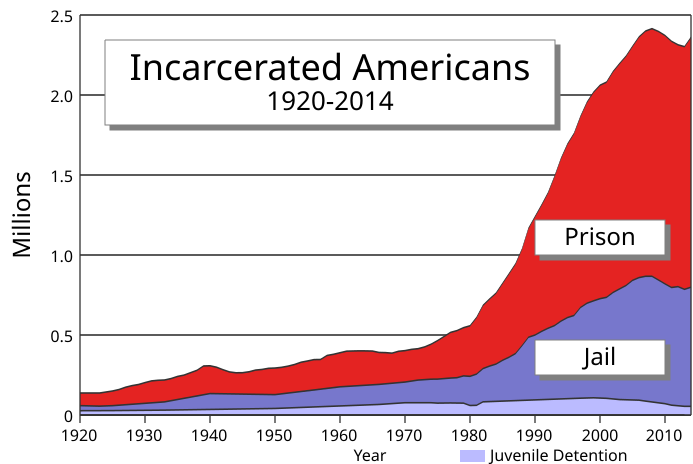1. Three "strikes" and you get life in jail. Even for trivial crimes, Leandro Andrade is serving 2 consecutive life sentences for shoplifting 9 video tapes with a value of $153
2a. 1% of Americans are in jail(2.3million)
2b On a per capita bases this equates to twice as many in South Africans, more than 3 times Iran and 6 times China's prison population.
3. No society in history has imprisoned as many people as America.
4. 1 in 30 men aged 20 - 34 in in prison.
5.1 in 9 black males are in prison.
6. There are more 17 year old black males in prison than in college.
7. 5% of the world are American...25% of all prisoners are American.
8. America prohibits importing goods made through forced labor or prisoners...YET......American prisons produce 100% of all military helmets, ammunition belts, bullet proof vests,
9. 93% of domestically used paints, 36% of home appliances, 21% of office furniture, which allows America to compete with factories in Mexico.
10. You get solitary confinement if you refuse to work[/quote]
That's shocking.
The United States Prison Industrial Complex.
6. There are more 17 year old black males in prison than in college.
That's shocking.
[/quote]
Hmmm...17? I wonder how that ratio looks if you bump the age up to 18...you know, the age most college-entrants are when they start, as opposed to the majority age for high-school seniors? Kind of hard to be in college if you're still in high school.
Hazard Pay :: FPS/RTS in SharpDX (gathering dust, retained for... historical purposes)
DeviantArt :: Because right-brain needs love too (also pretty neglected these days)
5% of the world are American...25% of all prisoners are American.[/quote]That about sums it up.
You can't look at that statistic and say that there's not something wrong with either American justice or American morals. For one in 4 global prisoners to be in an American prison, there's obviously something in America that causes more people to be punished via incarceration, and/or causes more people to commit serious crimes. Injustice and inequality seem rife.
Also, what the hell happened in the 80's???
[font="arial, verdana, tahoma, sans-serif"]those ... jails are exclusively for those awaiting sentence, i.e. not guilty... they can be in maximum security violent facilities for years while still legally innocent. How's that for a concept.Sadly American jailing of innocents doesn't only apply to people in America. [/font]
[font="arial, verdana, tahoma, sans-serif"][edit]I read that as "those awaiting conviction", not "awaiting sentencing" -- people awaiting sentencing are guilty, those awaiting conviction aren't...[/edit][/font]
. 22 Racing Series .
Also, what the hell happened in the 80's???
wiki
[font=sans-serif][size=2]
The 1980s, though, ushered in a new era of prison privatization. With a burgeoning prison population resulting from the War on Drugs and increased use of incarceration, prison overcrowding and rising costs became increasingly problematic for local, state, and federal governments. In response to this expanding criminal justice system, private business interests saw an opportunity for expansion, and consequently, private-sector involvement in prisons moved from the simple contracting of services to contracting for the complete management and operation of entire prisons[/quote][/font]
[font=sans-serif][size=2]
[/font]
[font=sans-serif][size=2]Prisons became a business. That and heavy drugs.[/font]
[size="2"]I like the Walrus best.
There was also a big kick in the 80s-90s to "get tough on crime" and then in the early-mid 90s the crime rate went down (though clearly the prison population continued to grow, so what gives there?) -- anyhow, if you've read/seen Freakanomics, there was an interesting chapter about how legalization and availability of abortion was attributed to around 50% of the cause for the decline in crime. Of course, no one at the time had made that tie, and attributed it to all the new laws, over-policing, manditory minimums and three-strikes, and well, if crime wen't down all that stuff must be working right? By extension, keep it going, get tougher and build more prisons! Clearly this was the answer and we see the result. I think there's no small part played by observing a symptom of the desired outcome, and making that a measure of the goal.
I'd also be willing to wager that slight downtick in 2000 on the graph would be largely attributed to the war effort (either by absorbing would-be criminals, decreasing population pressure, and giving judges cause for leniency -- not sure how common it is these days for the ol' "go to prison or go to war"-type sentencing that sometimes happened in the Korea/Vietnam era.)
I'd also be willing to wager that slight downtick in 2000 on the graph would be largely attributed to the war effort (either by absorbing would-be criminals, decreasing population pressure, and giving judges cause for leniency -- not sure how common it is these days for the ol' "go to prison or go to war"-type sentencing that sometimes happened in the Korea/Vietnam era.)
throw table_exception("(? ???)? ? ???");
There was also a big kick in the 80s-90s to "get tough on crime" and then in the early-mid 90s the crime rate went down (though clearly the prison population continued to grow, so what gives there?)
People in prisons don't create crimes? Seems obvious to me. If everyone selling/buying drugs is in jail there's less chance of someone breaking into a house for extra money? From reading wikipedia and a few articles it sounds like a huge part of this is drug related. In the 70s people got really relaxed with drugs and then there was a crackdown and they're cleaning stuff up and that generation is in jail now.
Seems obvious to me. If everyone selling/buying drugs is in jail there's less chance of someone breaking into a house for extra money?No. The complete opposite:
If you put everyone selling drugs in jail (AKA prohibition), then you're artificially restricting the supply, which greatly increases the profits, which creates more incentive to sell drugs, which creates more drug dealers. That is, jailing dealers creates more dealers! And meanwhile, the ones in jail are basically in criminal university, learning how to be better dealers for when they get out.
Every dollar you spend on enforcement is a dollar that goes towards increasing the cost of drugs -- a dollar that goes into the pockets of criminal drug dealers. In this sense, by funding enforcement, you're funding drug dealers! Without enforcement they'd have no profit margin left -- their base product is too cheap without the state jacking up the prices via prohibition.
You can't put all the users in jail either -- unless you're going to jail the majority of your population, most of whom are completely innocent.
Also, by criminalising addiction (a mental illness that can be treated), you're isolating them from treatment and damning them to continue to be addicted. Combine this with the artificially inflated prices and you've got yourself burglaries for extra money.
This is all created by the "tough justice" system -- if you didn't treat users as criminals they'd be able to get cured, and if you didn't criminalize supply, the prices wouldn't be so incredibly inflated to require addicts to steal.
Look at the US prohibition of alcohol -- can you say that it didn't create crime? The same is true of modern prohibition. The main reason for drug related crime is prohibition.
This is also backed up by statistics, where countries with decriminalised drug systems have lower demand per capita despite their higher levels of supply (and consequently, ridiculously low levels of drug related crime).
. 22 Racing Series .
Hmmm...17? I wonder how that ratio looks if you bump the age up to 18...you know, the age most college-entrants are when they start, as opposed to the majority age for high-school seniors? Kind of hard to be in college if you're still in high school.
Those facts were compiled by a British person speaking British English and in Britain "college" starts at 16 and goes on till 18 so the statistic is not invalidated on that count. I guess a valid way of stating it using American English would be that "more 17 year old black males are in prison than in high school".
BTW, to those of you "imagining" that most prisoners are in there for violent crimes, plenty of sources have been cited in this thread that demonstrate you to be wrong.
EDIT: Further reading, http://www.lewrockwell.com/roberts/roberts43.html
A selection of my projects: Interactive Ray Tracer [W.I.P] , GPU based Rendering [W.I.P]
[quote name='Jacob Jingle' timestamp='1306877344' post='4818036']Are America's prisons filled with shoplifters? I don't know the real number, but I would imagine the number of nonviolent offenders that are locked up would be a really small majority(and most of them probably have a history of past violence).
http://en.wikipedia....onviolent_crime
[/quote]
Extremely biased and doesn't really give us the whole story. (Just because somebody is locked up for a nonviolent crime doesn't mean they're not a violent person. After all, AL Capone went to jail for tax evasion)
Isn't it something like 96% of criminals plea bargain their cases to lesser offenses?
Do these numbers from this wiki article factor this in? Does it factor in things like eyewitnesses refusing to press charges(common poor neighborhoods) and the courts being forced to go with lesser convictions? Do these numbers factor in a past history of violence? What does it classify as a nonviolent crime? (The author of that wiki article was clearly trying to spoon feed selective data to readers so that they would convert to his way of thinking)
Cheers,
Jacob Jingle
[quote name='forsandifs' timestamp='1306877607' post='4818039']http://en.wikipedia....onviolent_crimeExtremely biased and doesn't really give us the whole story. (The author of that wiki article was clearly trying to spoon feed selective data to readers so that they would convert to his way of thinking)[/quote]Wow... I think the simpler explanation is that you're ignoring selective data to avoid having to change your way of thinking.
What is it that makes you so afraid of accepting that only half the people in jail are violent? Why is the presentation of those statistics considered "spoon feeding" of some kind of wacky way of thinking??
If you really think it's being biased, instead of just presenting the reported facts, go slap a NPOV violation on it.
You can read the references yourself to see the definitions, and see that in federal prisons it's about a 50/50 split between these two groups
Violent: murder, non-negligent manslaughter, manslaughter, rape, other sexual assault, robbery, assault, and other violent offenses.
Non-violent: burglary, larceny, motor vehicle theft, fraud, other property crimes, weapons, drunk driving, court offenses, commercialized vice, morals and decency offenses, liquor law violations, other public-order offenses, juvenile offenses and other unspecified offense categories.
It also says that 20% of federal prisoners are in for drug offences (quite a large number of non-violent 'criminals').
Regarding plea-bargaining, it often doesn't change the category of the offence, just the degree of severity and/or sentencing. E.g. "common assault" down to "unlawful assault" (still assault).
. 22 Racing Series .
This topic is closed to new replies.
Advertisement
Popular Topics
Advertisement












